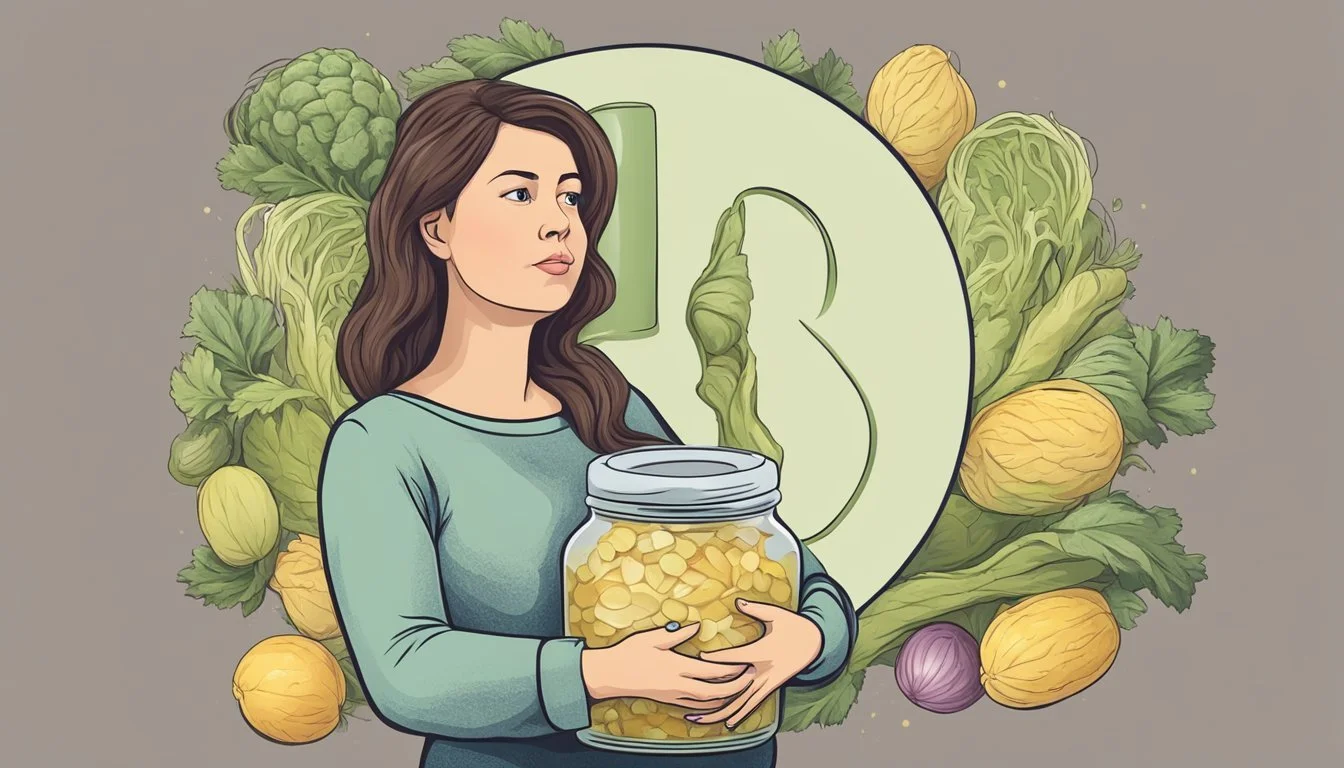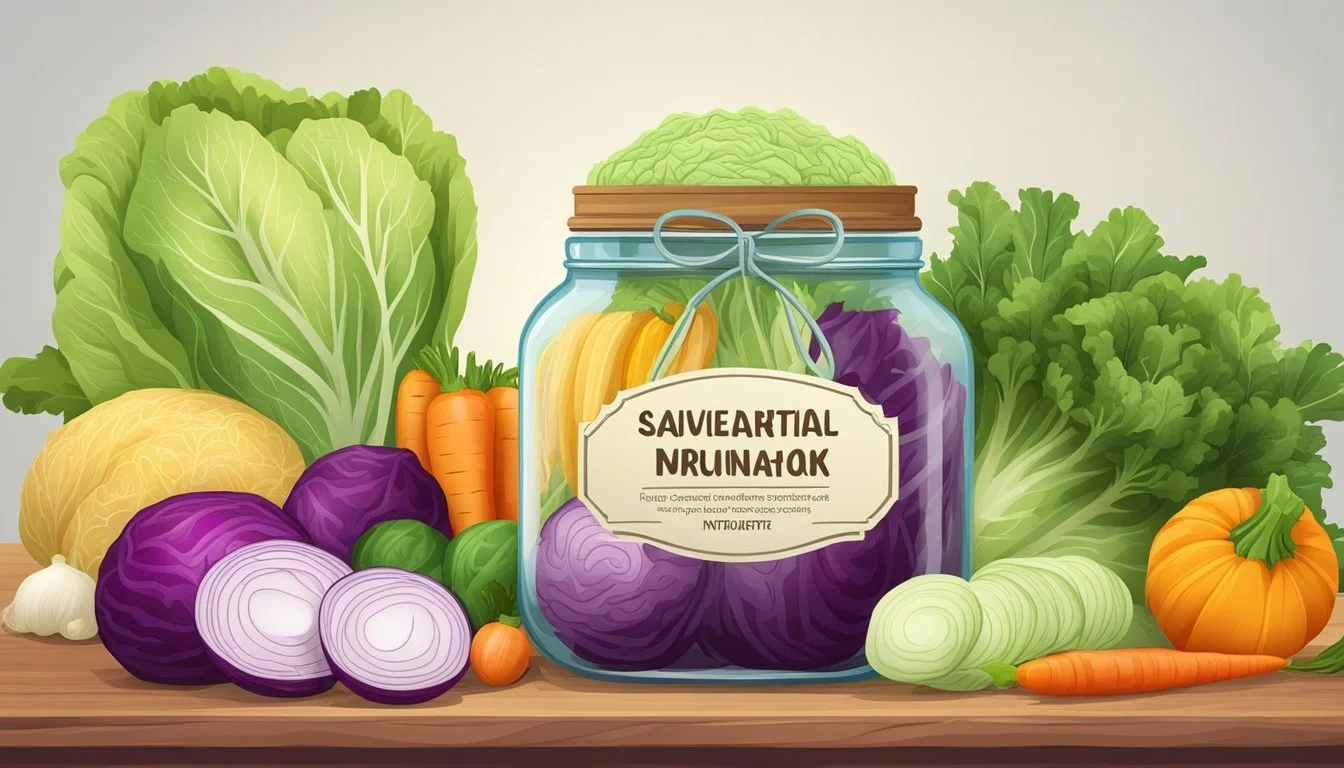Is it Safe to Consume Raw Sauerkraut During Pregnancy?
Unveiling the Facts
Pregnant women often navigate a complex dietary landscape, with sauerkraut being one of the foods that prompt caution. Sauerkraut, a traditional fermented cabbage dish, offers a range of nutrients beneficial to both mother and child. Its high vitamin C content boosts iron absorption, an important consideration during pregnancy when iron needs increase to support the growing fetus. Additionally, the fermentation process yields probiotics that can aid in maintaining healthy gut flora.
Nevertheless, the safety of consuming raw sauerkraut during pregnancy hinges on the preparation and handling of the product. While fermentation can inhibit the growth of harmful bacteria, ensuring that the sauerkraut is pasteurized or comes from a reliable source is crucial to reduce the risk of foodborne illnesses such as listeriosis, which pregnant women are particularly susceptible to due to changes in their immune system.
The consumption of sauerkraut during pregnancy can be regarded as safe when it is properly prepared and stored. Pregnant individuals are advised to opt for pasteurized varieties and should avoid those that are unpasteurized or have been inadequately fermented. Incorporating sauerkraut into the pregnancy diet can then be a healthy choice, supplying essential nutrients without compromising food safety standards.
Understanding Sauerkraut
Sauerkraut is a fermented food that has been prevalent in culinary traditions for centuries, noted for its distinctive sour taste and potential health benefits.
What Is Sauerkraut?
Sauerkraut is essentially fermented cabbage. It's recognized for its tangy flavor and long shelf life. Traditionally a staple in German cuisine, sauerkraut has gained worldwide popularity. It is often used as a condiment or side dish and is sometimes incorporated into recipes for its unique flavor and texture. The primary ingredient is cabbage, a cruciferous vegetable, which when fermented, contributes to the dietary intake of fiber, vitamins, and minerals.
Fermentation Process
The fermentation process transforms raw cabbage into sauerkraut and involves naturally occurring lactic acid bacteria that are present on the vegetable. The process is straightforward:
Cabbage is finely shredded.
The cabbage is mixed with salt.
It is then compacted and submerged in its juice.
Over a period of weeks, the environment becomes acidic due to the production of lactic acid, which acts as a preservative.
This natural preservation method not only imparts sauerkraut with its distinct sourness but also has the potential to make it a source of probiotics. Probiotics are beneficial bacteria that can contribute to gut health. It's important to note that pasteurization can destroy live probiotics, hence why unpasteurized sauerkraut might carry more probiotic benefits. However, the safety of unpasteurized foods during pregnancy is a separate consideration that needs to be addressed.
Sauerkraut and Pregnancy
When considering sauerkraut during pregnancy, it is important to weigh the health benefits it offers against the potential risks it may pose. Pregnant women can potentially benefit from its nutrient content, while being aware of the risks associated with raw, unpasteurized varieties.
Benefits During Pregnancy
Sauerkraut is a source of vitamins, such as vitamin C and K, and essential minerals. It provides dietary fiber, which may help manage common digestive issues during pregnancy. The fermentation process increases the availability of these nutrients, making sauerkraut a beneficial addition to a pregnant woman's diet. Additionally, a serving of sauerkraut can contribute to the iron and folate intake, important nutrients during pregnancy:
Vitamin C: Reinforces the immune system and enhances iron absorption.
Folate: Supports fetal development and reduces the risk of neural tube defects.
Dietary Fiber: Aids in digestion and helps prevent constipation.
Iron: Essential for increasing blood volume and preventing anemia.
Nutrient content per 1 cup of sauerkraut (approximate):
Nutrient Amount Vitamin C 35% of RDI Iron 2 mg Folate Varies Dietary Fiber 4 g
RDI: Recommended Daily Intake
Potential Risks
The primary concern with consuming raw sauerkraut during pregnancy stems from the possibility of bacterial contamination. Pregnant women have a more susceptible immune system, which could be overwhelmed by harmful bacteria such as listeria, present in unpasteurized foods. The risks are mitigated by choosing pasteurized sauerkraut or ensuring it is fully cooked before consumption.
Bacterial Infection: Raw, unpasteurized sauerkraut could harbor harmful bacteria.
High Sodium Content: Sauerkraut often contains significant amounts of sodium, which should be consumed in moderation.
Key points for pregnant women considering sauerkraut:
Opt for pasteurized or fully cooked sauerkraut to ensure safety.
Moderate consumption to balance nutrient intake with sodium levels.
Consult a healthcare provider before adding sauerkraut to the diet.
Food Safety Considerations
When considering sauerkraut consumption during pregnancy, the distinction between pasteurized and unpasteurized varieties is crucial, as the risk of foodborne illness from harmful bacteria is a significant concern.
Unpasteurized vs. Pasteurized Sauerkraut
Pasteurized Sauerkraut: This variety has undergone a heating process that destroys harmful bacteria, making it safer for pregnant individuals. The pasteurization process aims to eliminate the risk of foodborne illnesses without significantly altering the taste and nutritional value of sauerkraut.
Unpasteurized Sauerkraut: Often contains live and active cultures which can be beneficial for gut health. However, it may also harbor pathogens that pose a risk to individuals with weakened immune systems, such as pregnant women.
Raw Sauerkraut Safety
Harmful Bacteria: Raw, unpasteurized sauerkraut can carry harmful bacteria, such as Listeria, which can lead to serious foodborne illnesses. Pregnant individuals are particularly at risk as their immune systems are naturally suppressed to accommodate the fetus.
Consulting a Doctor: It's recommended for pregnant women to speak with their healthcare provider about including unpasteurized fermented products in their diet. The FDA advises against the consumption of raw, unpasteurized products during pregnancy due to the potential for bacterial contamination.
Dietary Concerns
Consuming raw sauerkraut during pregnancy raises certain dietary concerns, specifically regarding its sodium and caloric content, which must be carefully considered to maintain a balanced pregnancy diet.
Sodium and Caloric Content
Raw sauerkraut is relatively low in calories, but it can be high in sodium. Pregnant women should monitor sodium intake to reduce the risk of elevated blood pressure and associated complications.
Calories: Typically, sauerkraut contains about 27 calories per cup.
Sodium: A single cup may contain upwards of 939mg of sodium.
Pregnant individuals must ensure that their intake of sauerkraut does not cause them to exceed the recommended daily sodium limit.
Balance in Pregnancy Diet
A balanced diet during pregnancy is crucial for both the mother's and the fetus’s health. Moderation is key when incorporating sauerkraut due to its bold flavor and high sodium content.
Constipation and Digestion: The fiber in sauerkraut can help prevent and relieve constipation, a common issue in pregnancy.
Cravings for Sour Foods: Cravings, such as for sour foods, are common in pregnancy and may lead individuals to seek out sauerkraut.
It's important to factor sauerkraut into the overall diet, ensuring it does not displace other essential nutrients.
Probiotics in Pregnancy
During pregnancy, a woman’s body undergoes numerous changes that impact her immune system and gut health. Probiotic-rich foods, like sauerkraut, provide beneficial bacteria that support these systems.
Immunity and Gut Health
Probiotics are live microorganisms that can offer health benefits when consumed in adequate amounts. In pregnant women, the gut microbiome becomes even more crucial as it can influence both the mother’s and the baby's immune system. Probiotics contribute to the diversity and balance of the gut microbiome, which in turn can enhance the body's defense mechanisms. The positive impact on the immune system could help reduce the risk of complications such as gestational diabetes and preterm birth.
Beneficial Microbes: They may increase the number of positive gut bacteria.
Balanced Gut Flora: This can lead to an improved immune response.
Reduced Complications: A healthy gut microbiome is associated with a decreased risk of common pregnancy-related issues.
Probiotic Benefits of Sauerkraut
Sauerkraut, a form of fermented cabbage, is a natural source of probiotics. During the fermentation process, beneficial bacteria break down the natural sugars in cabbage, resulting in the production of probiotics. These probiotics can help maintain a healthy gut environment when consumed. Additionally, sauerkraut can be a nutritious part of a pregnant woman’s diet as it provides fibers and vitamins that are essential during pregnancy.
Natural Probiotics: Sauerkraut contains live, beneficial bacteria.
Nutritionally Rich: It is also a source of fiber and vitamins such as Vitamin C and K.
While the advantages of probiotics during pregnancy, like those naturally occurring in sauerkraut, are well noted, pregnant women should always consult their healthcare provider before making dietary changes to ensure safety and personal health needs are met.
Nutritional Benefits of Sauerkraut
Sauerkraut, a fermented cabbage dish, is known for being rich in nutrients while also serving as a potent source of dietary fiber and live probiotics.
Vitamins and Minerals in Sauerkraut
Sauerkraut is a nutrient-rich food that provides a variety of vitamins and minerals essential for overall health. It contains vitamin C, a powerful antioxidant important for the immune system, and skin health. A 100 gram serving of sauerkraut can deliver about 24% of the recommended daily intake of vitamin C. It's also a good source of vitamin K, which plays a crucial role in blood clotting and bone health. Additionally, sauerkraut offers vitamin B6 and folate, both of which are important for energy metabolism and the production of red blood cells.
Vitamin C: about 14.7 mg per 100 grams
Vitamin K: crucial for blood and bone health
Vitamin B6 and folate: important for energy and red blood cells
Beyond vitamins, sauerkraut supplies essential minerals such as iron, used to create new red blood cells, and manganese, which supports bone formation and blood clotting. Potassium, also found in sauerkraut, is key in regulating fluid balance and nerve signals.
Iron: essential for red blood cell production
Manganese: supports bone health and blood clotting
Potassium: regulates fluid balance and nerve function
Fiber and Digestive Health
The dietary fiber in sauerkraut aids in digestion by promoting regular bowel movements and helping to prevent constipation. By contributing to a sense of fullness, fiber may also assist in weight management. Notably, a one-cup serving of sauerkraut contains about 4 grams of fiber.
Furthermore, sauerkraut is a rich source of probiotics, which are beneficial bacteria that support gut health. These probiotics, along with enzymes present in sauerkraut, can enhance digestive health and may aid in the absorption of nutrients.
Dietary Fiber: approximately 4 grams per cup, aids in digestion and weight management
Probiotics and Enzymes: improve digestive health and nutrient absorption
Additionally, the prebiotic content in sauerkraut—a form of dietary fiber—serves as nourishment for these beneficial gut bacteria, further enhancing its role in maintaining a healthy digestive system.
Preparing and Consuming Sauerkraut
When considering the consumption of sauerkraut during pregnancy, safety in preparation and methods of integration into meals are paramount. Ensuring that sauerkraut is safe to consume involves proper handling techniques and selecting the right type to complement various dishes.
Safe Handling and Preparation
Sauerkraut must be handled with care to avoid contamination and maintain its health benefits. Pasteurized sauerkraut is recommended for pregnant individuals as pasteurization kills any potential harmful bacteria. For homemade sauerkraut:
Ensure all equipment is sterilized.
Use high-quality, unprocessed sea salt for lacto-fermentation.
Cabbage should be thoroughly washed to remove dirt and chemicals.
Shred cabbage and mix with the correct proportion of sea salt.
Pack tightly into a clean jar, submerging it under its own brine.
Seal and allow the mixture to ferment at room temperature, away from direct sunlight.
The shelf life of homemade sauerkraut can be extended if stored properly in a cool, dark place, like a refrigerator.
Incorporating Sauerkraut in Meals
Sauerkraut's versatile sour taste makes it an excellent addition to various dishes while contributing to gut health. It can be used as a condiment or included in recipes:
Sandwiches: Add to Reuben sandwiches for a classic taste or any sandwich for a tangy crunch.
Salads: Mix into German potato salad or regular green salads for an extra flavor profile.
Stews: Incorporate into stews with meats like kielbasa for a hearty meal.
To maintain its preservative and probiotic qualities, avoid cooking sauerkraut at high heat. Gentle warming is sufficient if you prefer it slightly softened. Pair sauerkraut with other fermented foods, such as kefir, kombucha, or miso, for a well-rounded diet promoting gut health. Always seek personalized advice if unsure about including sauerkraut in your diet during pregnancy.
Considerations for Healthcare Consultation
Eating raw sauerkraut during pregnancy can provide health benefits, but it also comes with certain risks that necessitate consulting healthcare providers.
When to Seek Medical Advice
Raw sauerkraut and pregnancy: Due to the potential for contamination, such as with listeria which can lead to listeriosis — a serious infection that may cause miscarriage, stillbirth, or complications such as premature delivery and low birth weight — pregnant women should consult their doctor before including raw sauerkraut in their diet.
Listeriosis risks: This infection is particularly concerning during pregnancy as it can compromise the mother's immune system, posing risks to the baby's health, including birth defects and potential impacts on birth weight.
High-risk conditions: Women with conditions such as anemia or weakened immunity should also discuss any dietary changes with their healthcare provider.
Symptoms to monitor: It's critical to seek immediate medical advice if symptoms like fever, muscle aches, or gastrointestinal distress occur after consuming raw sauerkraut as these may indicate an infection, including listeriosis or yeast infections, which require prompt treatment.
Conclusion: While sauerkraut provides benefits such as probiotics for digestive health, it is important for pregnant women to only consume pasteurized versions and to have a discussion with their healthcare provider regarding its safety and any potential risks associated with its consumption during pregnancy.







